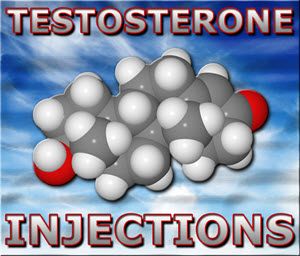 Testosterone therapy has been around for a long time – since 1939, to be exact.
Testosterone therapy has been around for a long time – since 1939, to be exact.
Men (mainly) have been using this therapy to treat hormonal issues such as low testosterone or hypogonadism and illegally for sports and weightlifting.
Throughout the decades, there has been concern over cardiovascular (CV) risks associated with testosterone use, even when used safely and correctly to treat low testosterone under the supervision of a doctor. Studies have shown this is not the case, yet another analysis shows the same conclusion.
 No Evidence of Short- to Medium-Term CV Risk
No Evidence of Short- to Medium-Term CV Risk
A systematic review and meta-analysis published in The Lancet Healthy Longevity journal showed no evidence of short- to medium-term CV risk associated with testosterone replacement therapy (TRT) during treatment for hypogonadism.
This review and meta-analysis are not just one study conducted on its own but a review and deep search in publication databases of all the studies related to testosterone therapy and cardiovascular issues.
Scientists from the University of Aberdeen (United Kingdom) underwent a thorough search for randomized controlled trials involving patients who had an initial testosterone level of 12 nmol/L or less or who were on testosterone therapy for at least 3 months.
 The scientists found 35 studies that fit this criterion.
The scientists found 35 studies that fit this criterion.
In these randomized and controlled trials, some patients were assigned testosterone injections (a total of 1,724 patients) or a placebo (1,656 patients).
Since the studies all had the patients on testosterone therapy for a range of time frames, the average was taken at 9.5 months.
Not surprisingly, the treatment increased testosterone levels, free testosterone, hemoglobin, and hematocrit. Unfortunately, 14 of the 35 studies did report mortality data with the causes of death, including aortic aneurysm and myocardial infarction, as well as undetermined. However, the mortality risks did not differ between testosterone and placebo patients.
No Evidence of Increased Morality or Cardiovascular Risk
Once all of the data was combined, no evidence was found showing any increased risk of mortality or cardiovascular or cerebrovascular risk. In addition, there was no evidence showing an association between testosterone use and diabetes, prostate cancer, or high blood pressure.
One limitation of this analysis was that there was hardly any long-term data. Therefore, we can only base this information on short-term and medium-term lengths of time.
The study investigators stated, “...the current results provide some reassurance about the short-term to medium-term safety of testosterone to treat male hypogonadism.” Obviously, more studies should be conducted on the safety of TRT.
Still, suppose a man or even a woman is experiencing low testosterone to the point where it’s affecting their quality of life. In that case, it’s OK to consider the risk-to-benefit ratio of trying hormone therapy.
 Low testosterone can really cause problems in a man’s life, including causing depression and anxiety that can be life-threatening. Testosterone is one of those hormones that are essential for a man’s health.
Low testosterone can really cause problems in a man’s life, including causing depression and anxiety that can be life-threatening. Testosterone is one of those hormones that are essential for a man’s health.
It’s best to take it seriously and consider what life is like if there is no intervention.
Our clinic provides high-quality hormone treatment with proper safety protocols and consistent doctor-patient consultation to ensure protocols are being followed. It’s the only way to treat hypogonadism effectively.
Reference
Contact Us Today For A Free Consultation

- Cano's spokeswoman was client of Biogenesis [Last Updated On: January 25th, 2024] [Originally Added On: May 4th, 2013]
- Documents: Cano associate was client of clinic [Last Updated On: January 25th, 2024] [Originally Added On: May 4th, 2013]
- Sources: Cano associate was Biogenesis client [Last Updated On: January 25th, 2024] [Originally Added On: May 4th, 2013]
- Early Stage Testicular Cancer - Surveillance Is Best Follow-Up Strategy [Last Updated On: January 25th, 2024] [Originally Added On: May 18th, 2013]
- 2013 Endocrine Function Testing Market in Europe: Hospitals, Commercial Labs, Physician Offices, Ambulatory Care Centers [Last Updated On: January 25th, 2024] [Originally Added On: June 14th, 2013]
- Europe Endocrine Function Testing Market Studied by VPG in Cutting-Edge Report Now Available at MarketPublishers.com [Last Updated On: January 25th, 2024] [Originally Added On: June 18th, 2013]
- A More 'Natural' Version Of IVF Proves A Success [Last Updated On: January 25th, 2024] [Originally Added On: June 19th, 2013]
- Weight Loss Cure with Metabolic Cookbook - Video [Last Updated On: January 25th, 2024] [Originally Added On: July 12th, 2013]
- Weight Loss Drops - Are They A Scam? - Video [Last Updated On: January 25th, 2024] [Originally Added On: July 12th, 2013]
- Abbott Features Solutions to Help Labs Prepare for the Evolving Healthcare Landscape at the American Association for ... [Last Updated On: January 25th, 2024] [Originally Added On: July 30th, 2013]
- How Testicular Cancer Is Diagnosed | Testicular Cancer - Video [Last Updated On: January 25th, 2024] [Originally Added On: August 11th, 2013]
- 2014 Opportunities in the US Clinical Chemistry and Immunodiagnostics Markets [Last Updated On: January 25th, 2024] [Originally Added On: September 27th, 2013]
- Serie A - Doping ban overturned on cancer sufferer Acerbi [Last Updated On: January 25th, 2024] [Originally Added On: January 8th, 2014]
- Health Highlights: Jan. 8, 2014 [Last Updated On: January 25th, 2024] [Originally Added On: January 8th, 2014]
- Testosterone Replacement Therapy [Last Updated On: December 9th, 2023] [Originally Added On: January 19th, 2014]
- Paid Hepatitis C Clinical Trial Now Enrolling at Avail Clinical Research near Orlando, Florida; Accepting M/F Patients ... [Last Updated On: January 25th, 2024] [Originally Added On: January 22nd, 2014]
- Luteal Phase: The Uterine Lining Phase - Video [Last Updated On: January 25th, 2024] [Originally Added On: April 10th, 2014]
- Doping case against Acerbi dismissed [Last Updated On: January 25th, 2024] [Originally Added On: April 15th, 2014]
- Drugs that Cause Gynecomastia [Last Updated On: January 25th, 2024] [Originally Added On: May 14th, 2014]
- Illegal Online Meds Targeted in Worldwide Crackdown, FDA Says [Last Updated On: January 25th, 2024] [Originally Added On: May 24th, 2014]
- Biogenesis' Bosch surrenders in PEDs case [Last Updated On: January 25th, 2024] [Originally Added On: August 5th, 2014]
- Duchess of Cambridge 'hugely disappointed' after being forced to pull out of yet another engagement due to morning ... [Last Updated On: January 25th, 2024] [Originally Added On: October 1st, 2014]
- Kate, Duchess of Cambridge dazzles in baby blue gown at the Natural History Museum [Last Updated On: January 25th, 2024] [Originally Added On: October 22nd, 2014]
- 'They're poisoning us'. How religious leaders are hindering vaccination programmes across the world [Last Updated On: January 25th, 2024] [Originally Added On: November 14th, 2014]
- Poor prognosis germ-cell tumours are only cured in about half of patients. We aimed to assess whether treatment ... [Last Updated On: January 25th, 2024] [Originally Added On: November 23rd, 2014]
- Nursing a Grudge [Last Updated On: January 25th, 2024] [Originally Added On: January 22nd, 2015]
- Hormone Levels in Men - Testosterone Injections [Last Updated On: November 30th, 2021] [Originally Added On: September 9th, 2016]
- Human Growth Hormone May Actually IMPROVE Quadricep Strength After Reconstruction of Torn ACL [Last Updated On: September 23rd, 2024] [Originally Added On: June 22nd, 2020]
- Six Ways to Feel Good and Balance Your Hormones at the Same Time! [Last Updated On: January 25th, 2024] [Originally Added On: September 24th, 2020]
- Your Birthplace Heavily Influences Your Future Testosterone Levels [Last Updated On: August 19th, 2024] [Originally Added On: March 6th, 2021]
- Both High and Low Levels of Testosterone Correlate With Cardiovascular Issues in Men [Last Updated On: September 27th, 2024] [Originally Added On: April 14th, 2021]
- Breaking News: Testosterone May Be the Answer to Autoimmune Diseases [Last Updated On: August 24th, 2024] [Originally Added On: May 14th, 2021]
- Non-Stop Cravings for Protein? Blame it on Your Gut Hormones! [Last Updated On: September 13th, 2024] [Originally Added On: May 21st, 2021]
- Testosterone Therapy Could Help Quell Your Asthma Attacks [Last Updated On: September 12th, 2024] [Originally Added On: June 20th, 2021]
- BPA Here, BPA There, What’s the Reason for the Scare? [Last Updated On: September 16th, 2024] [Originally Added On: June 29th, 2021]
- Low Testosterone Linked to Depression and Suicidal Ideation [Last Updated On: August 25th, 2024] [Originally Added On: July 5th, 2021]
- It’s True: Men Today Have Less Testosterone Compared to Men a Generation Ago [Last Updated On: September 19th, 2024] [Originally Added On: July 13th, 2021]
- Losing Weight with Baratric Surgery Reverses Low Testosterone [Last Updated On: October 2nd, 2024] [Originally Added On: February 8th, 2022]
- Do Larger Testicles Make More Testosterone? [Last Updated On: July 24th, 2024] [Originally Added On: May 3rd, 2022]
- Fact or Myth: Have Testosterone Levels Really Dropped by 50% Just in the Past Two Decades? [Last Updated On: August 14th, 2024] [Originally Added On: June 4th, 2022]
Word Count: 535




















